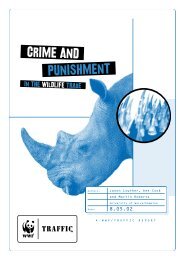Deeper Luxury Report - WWF UK
Deeper Luxury Report - WWF UK
Deeper Luxury Report - WWF UK
You also want an ePaper? Increase the reach of your titles
YUMPU automatically turns print PDFs into web optimized ePapers that Google loves.
<strong>WWF</strong> works towards a future in which humans live in<br />
harmony with nature. This is one of the most important<br />
and urgent challenges facing humanity, yet we are<br />
failing to meet it. The Living Planet Index, published<br />
every two years by <strong>WWF</strong>, uses average trends in<br />
populations of terrestrial, freshwater and marine<br />
species worldwide as indicators of the health of our<br />
planet. This index declined by around 30% between<br />
1970 and 2003 (Figure 1). It is so well supported by<br />
scientific evidence that, in 2004, it moved Nature<br />
magazine to warn that we could lose a quarter of<br />
all living species by 2050. 10<br />
The ultimate cause of this decline is over-consumption<br />
of irreplaceable natural resources by humans. Global<br />
consumption levels are five times what they were just<br />
50 years ago, and the natural world is buckling under<br />
the weight of demand. Symptoms include pressure<br />
on ecosystems (already leading to complete collapse<br />
in some instances), soil loss and degradation, ground<br />
water depletion, loss of productive land and the<br />
accumulation of toxins. 11<br />
We must reduce overall levels<br />
of consumption.<br />
Figure 1: Living Planet Index 1970-2003<br />
1.6<br />
1.4<br />
1.2<br />
1.0<br />
0.8<br />
0.6<br />
0.4<br />
0.2<br />
0<br />
1960 1970 1980 1990 2000 03<br />
The Ecological Footprint is <strong>WWF</strong>’s measure of how<br />
we are depleting stocks of renewable natural resources.<br />
In Figure 2, it is expressed in the number of planets,<br />
where one planet equals the total biologically productive<br />
capacity of the Earth in any one year. In 2001, humanity’s<br />
footprint exceeded the Earth’s biological capacity by<br />
approximately 20%. This overshoot depletes the Earth’s<br />
natural capital and is therefore possible only for a<br />
limited time. 12<br />
If everyone were to live like the average European,<br />
three planets would be needed to provide adequate<br />
quantities of natural resources – for the average North<br />
American, five planets would be required. 13<br />
It would be<br />
physically impossible for all the world’s poor to achieve<br />
greater wellbeing in the same ways that Europeans and<br />
North Americans have managed so far. Such wasteful<br />
development is possible only for a minority, and for a<br />
limited time. This is neither morally nor environmentally<br />
sustainable. Our challenge is to find ways to improve<br />
human wellbeing within natural limits; to stop living as<br />
though we had another planet to go to.<br />
Figure 2: Humanity’s ecological footprint 1961-2003<br />
1.6<br />
1.4<br />
1.2<br />
1.0<br />
0.8<br />
0.6<br />
0.4<br />
0.2<br />
0<br />
1960 1970 1980 1990 2000 03<br />
<strong>Deeper</strong> <strong>Luxury</strong><br />
8/9


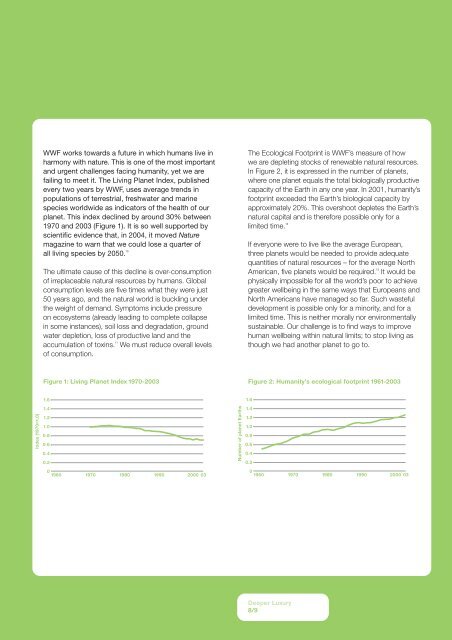
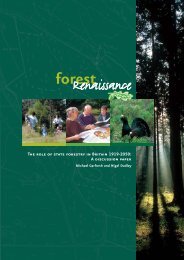
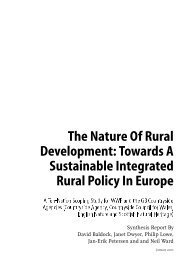
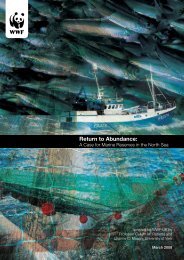
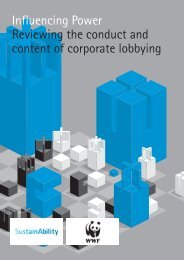
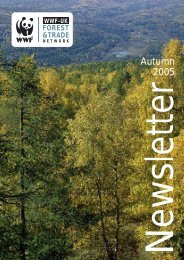
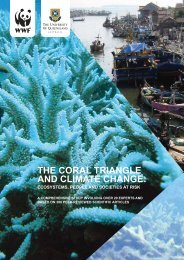
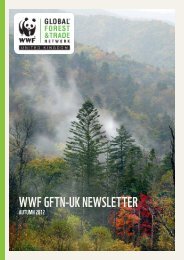
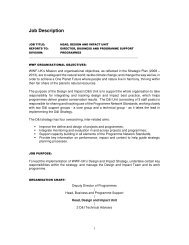
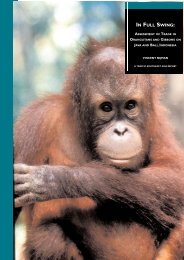
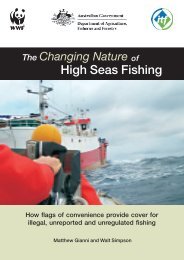
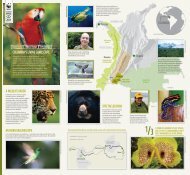
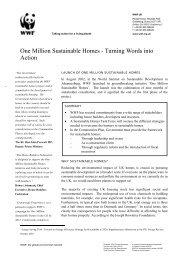
![[PDF] Causes for concern: chemicals and wildlife - WWF UK](https://img.yumpu.com/31929970/1/184x260/pdf-causes-for-concern-chemicals-and-wildlife-wwf-uk.jpg?quality=85)
